| Source (Hebrew) | Translation (English) | Translation (Yiddish) |
|---|---|---|
כֹּל עוֹד בַּלֵּבָב פְּנִימָה נֶפֶשׁ יְהוּדִי הוֹמִיָּה, וּלְפַאֲתֵי מִזְרָח קָדִימָה, עַיִן לְצִיּוֹן צוֹפִיָּה; |
As long as in the heart, within, the soul of a Jew (Yehudi) still yearns, and onward, towards the corner of the East, an eye still looks toward Tsiyon; |
כּל־זמן הערצער זיך נאָך רעגן, הערצער ייִדישע נאָך גליִען, און צו ציונס מיזרח־ברעגן אױגן בענקענדיק זיך ציִען, |
עוֹד לֹא אָבְדָה תִקְוָתֵנוּ הַתִּקְוָה הַנּוֹשָׁנָה: לָשׁוּב לְאֶרֶץ אֲבוֹתֵינוּ, לְעִיר בָּהּ דָּוִד חָנָה. |
Our hope is not yet lost, the ancient hope: to return to the land of our ancestors, the city where David encamped. |
איז די האָפֿענונג און שטרעבן פֿון אַ מאָל נאָך ניט פֿאַרגעסן, ס’לאַנד פֿון אָבֿות צו באַלעבן װוּ ס’איז דודס הױז געװעזן. |
כָּל־עוֹד דְּמָעוֹת מֵעֵינֵינוּ יִזְּלוּ כְגֶשֶׁם נְדָבוֹת, וּרְבָבוֹת מִבְּנֵי עַמֵּנוּ עוֹד הוֹלְכִים עַל קִבְרֵי אָבוֹת. |
As long as tears from our eyes flow like benevolent rain, and throngs of our countrymen still pay homage at the graves of (our) ancestors; | |
כָּל־עוֹד חוֹמַת מַחֲמַדֵּינוּ לְעֵינֵינוּ מוֹפָעַת, וְעַל חֻרְבַּן מִקְדָּשֵׁנוּ עַיִן אַחַת עוֹד דוֹמָעַת. |
As long as our precious Wall appears before our eyes, and over the destruction of our Temple an eye still wells up with tears; | |
כָּל־עוֹד מֵי הַיַּרְדֵּן בְּגָאוֹן מְלֹא גְדוֹתָיו יִזֹּלוּ, וּלְיָם כִּנֶּרֶת בְּשָׁאוֹן בְּקוֹל הֲמוּלָה יִפֹּלוּ. |
As long as the waters of the Yarden in fullness swell its banks, and from the Yam Kinneret in tumult fall with a cacophonous voice; |
כּל־זמן שטאָלצע ירדנס אינדן אין די ברעגן זײַנע שטראָמען און זײ זינקען מיט געפּילדער אין דעם ים כּנרת׳ תּהומען, |
כָּל־עוֹד שָׁם עֲלֵי דְרָכַיִם שַעַר יֻכַּת שְׁאִיָּה, וּבֵין חָרְבוֹת יְרוּשָׁלַיִם עוֹד בּת צִיּוֹן בּוֹכִיָּה. |
As long as on the barren highways the humbled city gates mark, and among the ruins of Yerushalayim a daughter of Tsiyon still cries; | |
כָּל־עוֹד דְּמָעוֹת טְהוֹרוֹת מֵעֵין בַּת עַמִּי נוֹזְלוֹת, וְלִבְכּוֹת לְצִיּוֹן בְּרֹאשׁ אַשְׁמוֹרוֹת עוֹד תָּקוּם בַּחֲצִי הַלֵּילוֹת. |
As long as pure tears flow from the eye of a daughter of my people, and to mourn for Tsiyon at the watch of night, she still rises in the middle of the nights; | |
כָּל־עוֹד נִטְפֵי דָם בְּעוֹרְקֵינוּ רָצוֹא וָשׁוֹב יִזֹּלוּ, וַעֲלֵי קִבְרוֹת אֲבוֹתֵינוּ עוֹד אֶגְלֵי טַל יִפֹּלוּ. |
As long as drops of blood in our veins flow back and forth, and upon the graves of our ancestors dewdrops still fall; | |
כָּל־עוֹד רֶגֶשׁ אַהֲבַת הַלְּאוֹם בְּלֵב הַיְּהוּדִי פּוֹעֵם, עוֹד נוּכַל קַוּוֹת גַּם הַיּוֹם כִּי עוֹד יְרַחֲמֵנוּ אֵל זוֹעֵם. |
As long as the feeling of love of nation throbs in the heart of the Jew, we can still hope even today that El may still have mercy on us. | |
שִׁמְעוּ אַחַי בְּאַרְצוֹת נוּדִי אֶת קוֹל אַחַד חוֹזֵינוּ, כִּי רַק עִם אַחֲרוֹן הַיְּהוּדִי גַּם אַחֲרִית תִּקְוָתֵנוּ! |
Hear, O my fellows in the lands of exile, the voice of one of our visionaries, (who declares) that only with the very last Jew — only there is the end of our hope! |
הערט, פֿון גלות־לענדער, ברידער, הערט די שטים פֿון נבֿיאס שטראָפֿן, אַז בלױז מיט דעם לעצטן ייִדן קומען װעט דאָס לעצטע האָפֿן. |
לֵךְ עַמִּי, לְשָׁלוֹם שׁוּב לְאַרְצֶךָ, הַצֱּרִי בְגִלְעָד, בִּירוּשָׁלַיִם רוֹפְאֶךָ, רוֹפְאֶךָ יְיָ, חָכְמַת לְבָבוֹ, לֵךְ עַמִּי לְשָׁלוֹם, וּרְפוּאָה קְרוֹבָה לָבוֹא … |
Go, my people, return in peace to your land, the balm in Gilead, your healer in Yerushalayim. Your healer is YHVH, the wisdom of Their heart. Go my people in peace, healing is imminent… |
From the article “Hatiḳvah” on wikipedia:
The text of Hatikvah was written in 1878 by Naphtali Herz Imber, a Jewish poet from Zolochiv (Polish: Złoczów), a city nicknamed “The City of Poets”,[1] then in Austrian Poland, today in Ukraine. In 1882 Imber immigrated to Ottoman-ruled Palestine and read his poem to the pioneers of the early Jewish villages – Rishon Lezion, Rehovot, Gedera, and Yesud Hama’ala.
Imber’s nine-stanza poem, Tikvatenu (“Our Hope”), put into words his thoughts and feelings following the establishment of Petah Tikva (literally “Opening of Hope”). Published in Imber’s first book Barkai [The Shining Morning Star], Jerusalem, 1886, the poem was subsequently adopted as an anthem by the Hovevei Ẓion and later by the Zionist Movement at the First Zionist Congress in 1897. Hatikvah was chosen as the organisational anthem of the First Zionist Congress in 1897.
The British Mandate government briefly banned its public performance and broadcast from 1919, in response to an increase in Arab anti-Zionist political activity.
A former member of the Sonderkommando reported that the song was spontaneously sung by Czech Jews at the entrance to the Auschwitz-Birkenau gas chamber in 1944. While singing they were beaten by Waffen-SS guards.
The Yiddish translation is the one made by Hillel Meitin (1876-1947), first published in Lider fun der milḥome anṭologye (Poetry of This War), compiled by I. Kissin (New York, 1943), p. 13. The abridged translation follows the popular abbreviated rendition of the anthem, as derived from its choral arrangement and performance by the Yiddish Philharmonic Chorus.
The vocalized text of Hatikvah above was provided by the Ben-Yehudah Project. I have made an English translation that provides re-hebraicized and gender neutral divine names. –Aharon Varady
Source(s)

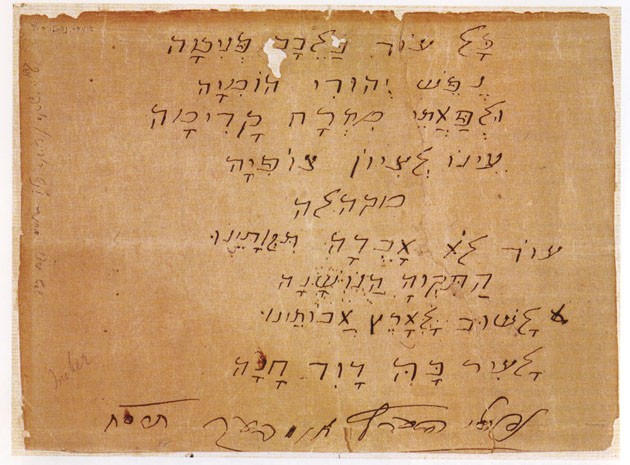
The first and second stanza of Hatikvah (handwritten manuscript by Naftali Herz Imber)

“הַתִּקְוָה | Hatiḳvah (the Hope), by Naphtali Herz Imber (1878)” is shared through the Open Siddur Project with a Creative Commons Attribution-ShareAlike 4.0 International copyleft license.
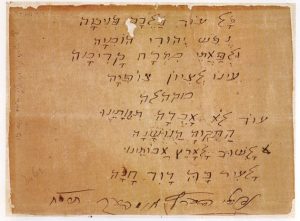


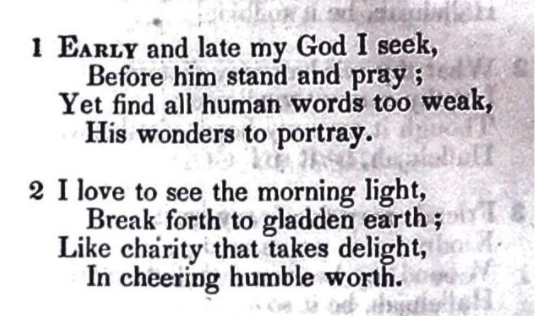

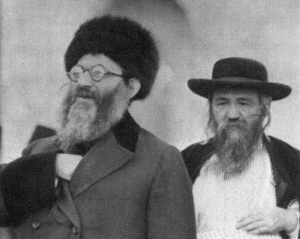
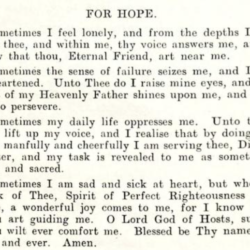
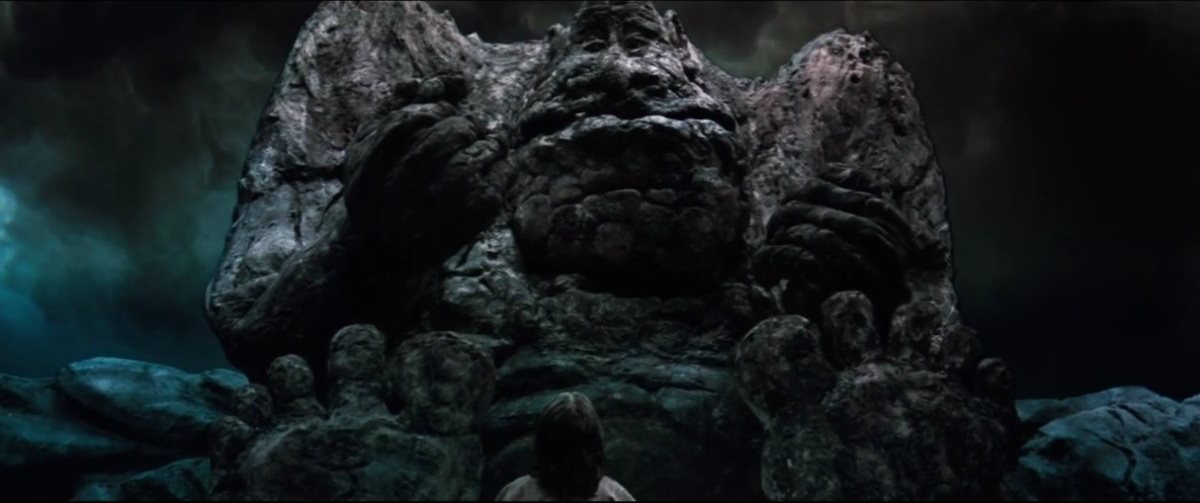


Leave a Reply